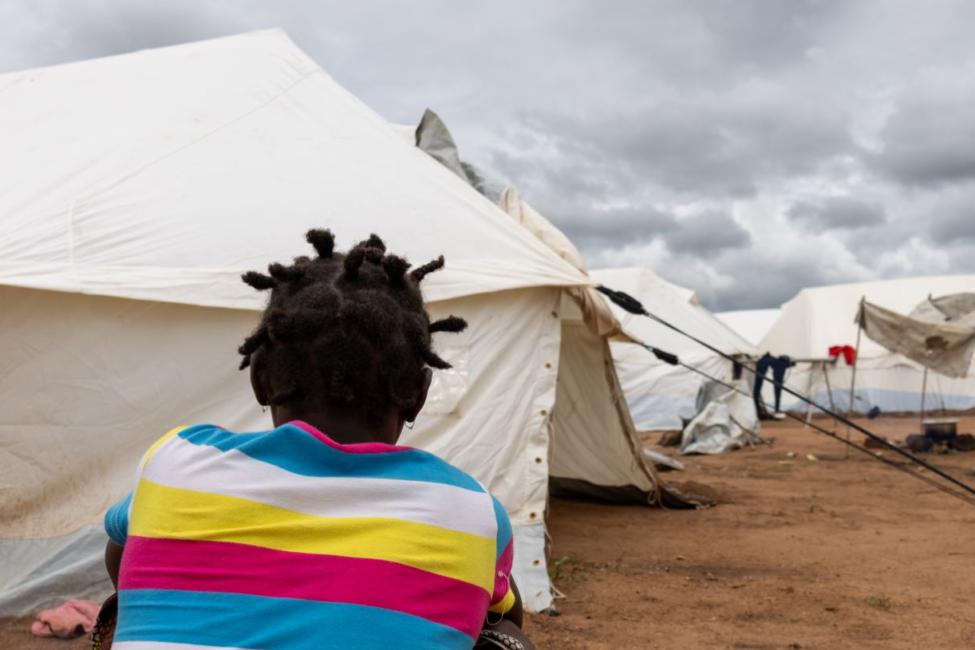-
Who we are
WHO WE AREThe International Organization for Migration (IOM) is part of the United Nations System as the leading inter-governmental organization promoting since 1951 humane and orderly migration for the benefit of all, with 175 member states and a presence in 171 countries.
-
Our Work
Our WorkAs the leading inter-governmental organization promoting since 1951 humane and orderly migration, IOM plays a key role to support the achievement of the 2030 Agenda through different areas of intervention that connect both humanitarian assistance and sustainable development.
What We Do
What We Do
Partnerships
Partnerships
- Where we work
-
Take Action
Take Action
Work with us
Work with us
Get involved
Get involved
- Data and Research
- 2030 Agenda
Over 110,000 Displaced in Mozambique Amidst Surging Violence as Needs Soar
Geneva/ Maputo, 8 March – More than 110,000 people have been displaced since the end of last year (22 December) by the resurgence of attacks by non-state armed groups in a distressing escalation of violence in Cabo Delgado Province. This alarming figure represents the second-largest wave of displacement in Cabo Delgado since the onset of the conflict in 2017, underscoring the deepening humanitarian crisis in the area.
The violence has seen a horrifying increase, with affected communities bearing the brunt of these relentless attacks. "We left our village in Ocua, Chiure, in the dead of night, scared because of those attacks happening nearby. We didn't bring anything with us, just the clothes on our backs. It's not just me, there's nine of us from my family, including the little ones. We're all in this together, trying to stay safe and keep each other going," shares Carlota, a displaced woman.
Responding to this humanitarian emergency, the International Organization for Migration (IOM) has been at the forefront, providing essential aid to over 22,000 recently displaced individuals. The organization's multifaceted approach includes managing displacement sites, delivering shelter, healthcare, mental health support, and coordinating a multifaceted response to meet the escalating needs. Despite these efforts, the magnitude of the crisis continues to outstrip available resources, highlighting a gap that urgently needs to be addressed.
"In the face of this harrowing crisis, the International Organization for Migration stands resolute in our commitment to providing support to those affected.” explains Dr. Laura Tomm-Bonde, IOM Mozambique Chief of Mission. “The challenges we face in meeting the needs of the displaced are significant. Our resources, including essential items, are dwindling rapidly, threatening to leave thousands already in vulnerable situation at risk, including women, children, and the elderly."
The escalating crisis has placed a considerable strain on IOM's Mobile Teams and Clinics, which are instrumental in providing health, nutrition, and psychosocial support across affected districts. The rising demand for mental health services and increased protection efforts against Gender-Based Violence and Sexual Exploitation and Abuse further compounds the urgency for enhanced support capabilities.
Despite substantial on-the-ground efforts to accommodate new arrivals and ensure coordinated response efforts, a significant funding shortfall jeopardizes the continuation of essential services. Only 15 per cent of the USD 43 million needed for IOM's portion of the Humanitarian Response Plan 2024 has been secured. This raises concerns that unmet needs could exacerbate an already critical situation.
As part of the Joint Response Programme in partnership with the World Food Programme (WFP) and the United Nations Children's Fund (UNICEF), emergency household items comprising shelter tarps, blankets, mosquito nets, kitchen sets, and sleeping mats have been distributed to 1,255 households. Additionally, food and hygiene kits have been provided, though the demand far exceeds the available resources, highlighting the escalating needs amid this crisis.
"The immediate and future needs of the displaced populations in Mozambique demand our collective attention and action," Dr. Tomm-Bonde reflects. "Beyond immediate relief, we are committed to addressing the root causes of the crisis and promote sustainable peace and development by combining humanitarian aid interventions with development, and peacebuilding initiatives."
As Mozambique continues to face this daunting humanitarian emergency, IOM calls for swift and comprehensive action from the international community to alleviate the suffering of the displaced and to work towards sustainable solutions to the violence that has plagued the region since 2017.
***
For more information, please contact:
Mozambique : Amanda Nero, anero@iom.int
Pretoria: Abibo Ngandu, angandu@iom.int
Geneva: Kennedy Okoth, kokoth@iom.int
